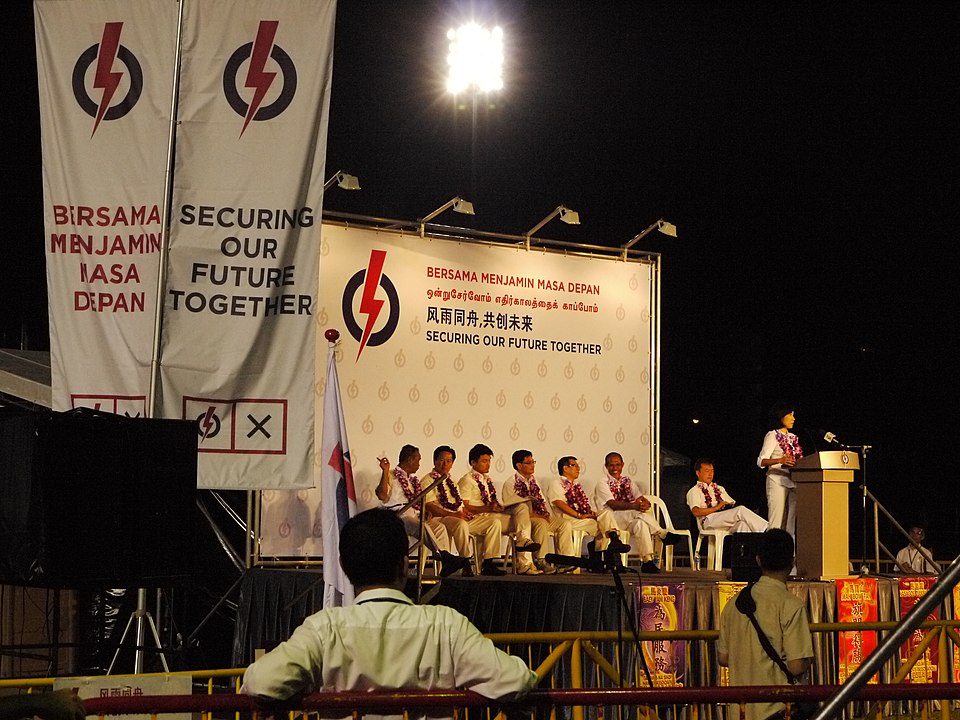
နိုင်ငံရေးတွင် မပါဝင်ခြင်း ပြဿနာ
ဆိုရှယ်မီဒီယာပလက်ဖောင်းများ ကြီးထွားလာခြင်းသည် နိုင်ငံသားများအတွက် နိုင်ငံရေးအရ ပါဝင်မှုကို လွယ်ကူချောမွေ့စေပြီး သန်းပေါင်းများစွာသော နိုင်ငံသားများအတွက် ပါဝင်မှုကုန်ကျစရိတ်ကို သက်သာစေသည် (Ahmed & Madrid-Morales, 2020; Gil de Zúñiga et al., 2012; 2014)။ သို့သော် များစွာသောသူတို့သည် နိုင်ငံရေးကို စိတ်ပါဝင်စားခြင်းမရှိဘဲ တက်ကြွစွာပါဝင်ခြင်း မရှိကြချေ (Ahmed & Gil-Lopez၊ 2022; Zhelnina၊ 2020)။ နိုင်ငံရေးကို စိတ်ဝင်စားမှုကင်းမဲ့ခြင်း ဆိုသည်မှာ နိုင်ငံရေးကိစ္စများကို ဂရုမစိုက်ခြင်း၊ အများပြည်သူဆိုင်ရာ ပွဲများနှင့် ရွေးကောက်ပွဲတွင် မဲပေးခြင်းကဲ့သို့သော နိုင်ငံရေးဆိုင်ရာ လှုပ်ရှားမှုများအပါအဝင် နိုင်ငံရေးဆိုင်ရာ အချက်အလက်များ၊လှုပ်ရှားမှုများကို စိတ်ဝင်စားမှုကင်းမဲ့ခြင်း ဖြစ်သည်။ နိုင်ငံရေးသိပ္ပံပညာရှင်များက ၎င်းအား လူမှုရေးပြဿနာဟု ယူဆကြသည် (Dean, 1965; Rosenberg, 1954)။ နိုင်ငံရေးတွင် တက်ကြွသော နိုင်ငံသားတဦးသည် ကောင်းမွန်စွာ လည်ပတ်နိုင်သော နိုင်ငံရေးစနစ်တခုအတွက် အရေးကြီးပါသည်။ ထို့ကြောင့် တိုးတက်အောင်မြင်သော ဒီမိုကရေစီဖြစ်ရန်မှာ နေ့စဉ်နိုင်ငံရေးနှင့် ရွေးကောက်ပွဲများတွင် နိုင်ငံသားများ၏ ပါဝင်ပတ်သက်မှု အတိုင်းအတာအပေါ် မူတည်ပါသည်။ ထို့အပြင် “လွဲချော်နေသော ပါဝင်ခြင်းသည် လွဲချော်နေသော အစိုးရလုပ်ရပ်များကို ဖြစ်စေပါသည်” (Griffin & Newman, 2005; p. 1206)။ သို့သော် မကြာသေးမီက လေ့လာမှုများစွာတွင် ဒီမိုကရေစီနိုင်ငံများစွာတွင် နိုင်ငံရေးကို စိတ်ပါဝင်စားမှု ကင်းမဲ့လာခြင်းကို တွေ့ရှိရကြောင်း ဖော်ပြခဲ့ကြသည် (Manning & Holmes, 2013; Henn et al., 2007; Pontes et al., 2017; Zhang, 2022)။ ထိုသို့သောအခြေအနေမျိုးတွင် နိုင်ငံရေးအရ တက်ကြွသော နိုင်ငံသားများနှင့် မတက်ကြွသောနိုင်ငံသားတို့ကြားတွင် နိုင်ငံရေးအရ ထိတွေ့ဆက်ဆံမှု ကွာဟချက်များ ကျယ်ပြန့်လာသည်နှင့် အမျှ နိုင်ငံသားအားလုံး၏ အမြင်များကို ဒီမိုကရေစီအရ ထင်ဟပ်နိုင်မှုမှာ တဖြည်းဖြည်း လျော့ပါးလာပါလိမ့်မည် (Griffin & Newman, 2005; Hansford & Gomez, 2010)။ ထို့ကြောင့် ယင်းသို့ နိုင်ငံရေးတွင် စိတ်ပါဝင်စားမှုကင်းမဲ့လာခြင်း ဖြစ်စဥ်ကို နောက်ပြန်ဆုတ်ရန် သို့မဟုတ် အနည်းဆုံးအားဖြင့် ယင်းကို အရှိန်လျှော့ရန် ကြိုးပမ်းဖို့ လိုအပ်ပါသည်။ မဟုတ်ပါက နိုင်ငံရေးပါဝင်မှုတွင် ဘက်လိုက်မှုများဖြစ်လာပါက ကိုယ်စားပြုမှုသည်လည်း ဘက်လိုက်မှု ဖြစ်လာပြီး တဖက်သတ် ရလဒ်များသာ ထွက်ပေါ်လာပါလိမ့်မည် (Griffin & Newman, 2005; Manning & Holmes, 2013)။

နိုင်ငံရေးတွင် မပါဝင်ဘဲ ရှိနေကြသူများ
နိုင်ငံရေးတွင် မပါဝင်ဘဲရှိကြသူများမှာ တွေ့ရှိရသော အထောက်အထားများအရ အသက်အရွယ်နှင့် ကျားမဂျန်ဒါတို့နှင့် ဆက်စပ်နေကြောင်း တွေ့ရှိရပြီး ငယ်ရွယ်သူများ (Henn et al., 2007; Snell, 2010; Zhang, 2022) နှင့် အမျိုးသမီးများသည် ဖြစ်ကြောင်း တွေ့ရှိရသည် García-Albacete၊ 2021; Vochocová et al., 2015)။ တနည်းဆိုရသော် နိုင်ငံရေးအရ ဂရုမစိုက်သော နိုင်ငံသားများသည် လူငယ် အမျိုးသမီးများဖြစ်ကြသည်။ တချိန်တည်းမှာပင် လူ့အဖွဲ့အစည်းအတွင်း မဲပေးရမည့် လူငယ်မဲဆန္ဒရှင် အရေအတွက်မှာ တိုးပွားလာလျက်ရှိသည်။ နိုင်ငံရေးတွင် အမျိုးသမီးပါဝင်ပတ်သက်မှု မရှိခြင်းသည် ကမ္ဘာတဝှမ်းရှိ လူ့အဖွဲ့အစည်းများစွာတွင် တွေ့ရှိနေရသည့် ကျားမဂျန်ဒါ နိုင်ငံရေးတွင် ကွာဟချက်ကို ပိုမိုကြီးမားလာစေလျက်ရှိသည် (Abendschön & García-Albacete, 2021; Ahmed & Madrid-Morales, 2020; Vochocová et al., 2015)။
နိုင်ငံရေးတွင် ပါဝင်ခြင်းနှင့် စပ်လျဥ်းလျှင် မြေပြင်အော့ဖ်လိုင်းနိုင်ငံရေးလှုပ်ရှားမှုများသည် ယေဘုယျအားဖြင့် အွန်လိုင်းတွင် ပါဝင်ခြင်းထက် ကုန်ကျစရိတ် ပိုမိုမြင့်မားသည်။ ထို့ကြောင့် မြေပြင် နိုင်ငံရေးတွင် ပါဝင်ရန် နိုင်ငံသားအများစုအတွက် ဆွဲဆောင်မှုမရှိနိုင်သော်လည်း အွန်လိုင်းတွင်မူ ပါဝင်ရန် စိတ်ပါဝင်စားနိုင်ပါသည်။ အထူးသဖြင့် အင်တာနက်နှင့် ဆိုရှယ်မီဒီယာ ထိုးဖောက်ဝင်ရောက်မှု ကြီးထွားလာခြင်းကြောင့် ဖြစ်သည်။ ရိုးရိုးရှင်းရှင်းဆိုရလျှင် တဦးနှင့် တဦးအပြန်အလှန်ဆက်သွယ်ရန် အင်တာနက်နှင့် ဆိုရှယ်မီဒီယာများမှ ပေါများသောအခွင့်အလမ်းများ ရရှိနိုင်သည်။ အွန်လိုင်း သတင်းအချက်အလက်နှင့် ဆက်သွယ်ရေးသည် ပွတ်တိုက်နိုင်မှု နည်းပါးသည့် အတွက် နိုင်ငံရေးအရ ပါဝင်မှုကို မြှင့်တင်ပေးနိုင်ပြီး နိုင်ငံရေးကို စိတ်မဝင်စားသော နိုင်ငံသားများကို ဆွဲဆောင်နိုင်သည်။ ဖန်သားပြင် တခုကို ထိတွေ့ရုံဖြင့် အမျိုးမျိုးသော အွန်လိုင်း နိုင်ငံရေး လှုပ်ရှားမှု များကို ဆောင်ရွက် လာနိုင်ပြီဖြစ်ပြီး ယင်းမှလည်း အပြုသဘောဆောင်သော လူမှုရေး နိုင်ငံရေး သက်ရောက်မှုများ ရရှိနိုင်ပြီဖြစ်သည် (Gil de Zúñiga et al., 2012; Jost et al., 2018)။ ဆန္ဒပြပွဲတွင် ပါဝင်ခြင်းကဲ့သို့သော မြေပြင်အော့ဖ်လိုင်းနိုင်ငံရေးပါ၀င်မှု၏ အရေးပါမှုကို အသိအမှတ်ပြုရန် အရေးကြီးသော်လည်း အွန်လိုင်းတွင် နိုင်ငံရေးအရပါဝင်မှုသည်လည်း အခြေခံအားဖြင့် တန်ဖိုးရှိပါသည်။ ဥပမာအားဖြင့် မဲဆန္ဒနယ်တခု၏ နိုင်ငံရေးသမားများ၊ ရုံးများနှင့် ဆက်သွယ်ချိတ်ဆက်ခြင်းသည် ယနေ့ခေတ် အခါလောက် အဆင်ပြေချောမွေ့ခြင်း မရှိခဲ့ပေ (Keaveney, 2015)။
မပါဝင်လိုက်ရမှာကို စိုးရွံ့ခြင်း (FOMO) ၏ အခန်းကဏ္ဍ
နိုင်ငံရေးကို စိတ်မဝင်စားသော နိုင်ငံသားများအား နိုင်ငံရေးတွင် တက်ကြွစွာ ပါဝင်လာစေရန် မည်သို့ ဆောင်ရွက်နိုင်မည်ကို ပညာရှင်များက ကာလရှည်ကြာ ငြင်းခုံခဲ့ကြသည်။ ဥပမာအားဖြင့် အရေးကြီးသော လူ့စိတ်ပိုင်းဆိုင်ရာ အတွေ့အကြုံဖြစ်သည့် မပါဝင်လိုက်ရမှာကို စိုးရွံ့ခြင်း (Fear of Missing Out – FOMO) သည် အွန်လိုင်းတွင် နိုင်ငံရေးအရ ပါဝင်ခြင်းနှင့် ဆက်စပ်နေသည်ကို တွေ့ရှိရသည်။ အထူးသဖြင့် နိုင်ငံရေးတွင် ပါဝင်ခြင်း မရှိဖြစ်နေသော နိုင်ငံသားများအတွက် ဖြစ်သည်။ Przybylski et al (2013) အရ FOMO သည် “မိမိမပါဝင်လိုက်ရဘဲ အခြားသူများ အကျိုးခံစားနေရမည်ကို ကျယ်ပြန့်စွာ စိုးရိမ်ပူပန်မှု” (စာမျက်နှာ – ၁၈၄၁) ဖြစ်သည်။ သို့ဖြစ်သည့်အတွက် အခြားသူများနှင့် အမြဲထိတွေ့လိုသော ဆန္ဒကို ဖြစ်ပေါ်စေသည်။ ယင်းက ဆိုရှယ်မီဒီယာကို အလွန်အကျွံ အသုံးပြုပြီး အခြားသူများနှင့် ချိတ်ဆက်ကာ မတူညီသော လူမှုရေးလှုပ်ရှားမှုများတွင် ပါဝင်ခြင်းကို ဖြစ်စေသည် (Przybylski et al., 2013)။ ယင်းအချက်ကို မကြာသေးမီက လေ့လာဆန်းစစ်မှုများတွင် ခိုင်မာစွာ တွေ့ရှိရသည် (Fioravanti et al., 2021; Tandon et al., 2021)။ အထူးသဖြင့် Przybylski et al (2013) က ဆိုသည်မှာ “FOMO သည် ဆိုရှယ်မီဒီယာနှင့် အပြုအမူဆိုင်ရာ ထိတွေ့ဆက်ဆံမှု မြင့်မားခြင်းနှင့် ဆက်စပ်နေသည်” (စာမျက်နှာ ၁၈၄၇) ဟုဆိုသည်။
ဤနောက်ခံကိုအခြေခံ၍ FOMO အဆင့်မြင့်မားသူများ (မပါလိုက်ရမှာကို စိုးရွံ့ခြင်းများသူများ) သည် အခြားသူများနှင့် နိုင်ငံရေးစကား ပြောဆိုခြင်း၊ နိုင်ငံရေးလှုပ်ရှားမှုများကို ပံ့ပိုးပေးခြင်းနှင့် နိုင်ငံရေးပွဲများတွင် ပါဝင်ခြင်း စသည့် အွန်လိုင်း နိုင်ငံရေးလှုပ်ရှားမှုများတွင် ပိုမို ပါဝင်နိုင်ချေ ပိုများသည် ဟု ကောက်ချက် ချနိုင်သည်။ ယင်းသို့ ဖြစ်ရခြင်းမှာ FOMO အဆင့်မြင့်မားသူများအနေဖြင့် လူမှုရေးဆိုင်ရာ ကိစ္စရပ်များ လွတ်မသွားလိုက်စေရန်အတွက် ၎င်းတို့၏ လူမှုကွန်ရက်များတွင် နိုင်ငံရေး အကြောင်းအရာများနှင့် အဖြစ်အပျက်များကို ပါဝင်လှုပ်ရှားနိုင်ရန် သေချာ စောင့်ကြည့်နေသောကြောင့် ဖြစ်သည် (Skoric et al., 2018)။ အချုပ်အားဖြင့်ဆိုရသော် လူများသည် မတူညီသော အကြောင်းရင်းများဖြင့် နိုင်ငံရေးလှုပ်ရှားမှုများတွင် ပါဝင်ကြသော်လည်း အဓိကအကြောင်းတခုမှာ FOMO ကြောင့်ဖြစ်နိုင်သည်။ အမှန်အားဖြင့်လည်း အချို့သုတေသနများအရ FOMO နှင့် သီးခြား အွန်လိုင်းနိုင်ငံရေးလှုပ်ရှားမှုများ (Ahmed, 2022; Skoric et al., 2018) အကြား ဆက်စပ်မှုကို တွေ့ရှိရသည်။ သို့သော် တိုက်ရိုက်ဆက်နွယ်မှုမျိုးဟုတော့ သုတေသနများက မညွှန်းဆိုပေ။ ထို့အပြင် အသက်နှင့် ကျားမ ဂျန်ဒါသည် FOMO (Rozgonjuk et al., 2021; Przybylski et al., 2013) နှင့် အတူ ဆက်စပ်နေကြောင်း အထောက်အထားများက ပြသသည်။ ထို့ကြောင့်၊ အသက်၊ ကျားမနှင့် FOMO တို့၏ အပြန်အလှန်ဆက်နွယ်မှုသည် အွန်လိုင်းနိုင်ငံရေးတွင် ပါဝင်မှုကို ရှင်းပြရာတွင် အရေးကြီး ပါသည်။

FOMO သည် နိုင်ငံရေးဆွေးနွေးမှုနှင့် ပါဝင်လှုပ်ရှားမှုနှင့် ဆက်စပ်နေသည်
ကျွန်ုပ်တို့သည် စစ်တမ်းအဖွဲ့အေဂျင်စီတခုကို အသုံးပြု၍ စင်ကာပူတွင် အွန်လိုင်းစစ်တမ်းတခု ကောက်ယူခဲ့ပါသည်။ စစ်တမ်းတွင်ပါဝင်သူများက ၎င်းတို့၏ နောက်ခံအချက်အလက်၊ မီဒီယာအသုံးပြုမှုအလေ့အထ၊ ဆိုရှယ်မီဒီယာသတင်းသုံးစွဲမှု၊ FOMO နှင့် နိုင်ငံရေးအပြုအမူတို့ နှင့်ပတ်သက်သည့် မေးခွန်းများကို ဖြေကြားခဲ့ကြသည်။ ထို့နောက် ကျွန်ုပ်တို့၏ ယူဆချက်ကို စမ်းသပ်ရန် စစ်တမ်းဒေတာကို အသုံးပြု၍ regression analysis နည်းလမ်းဖြင့် ယူဆချက်ကို စာရင်းဇယားပညာဖြင့် စမ်းသပ်ခဲ့ပါသည်။
ကျွန်ုပ်တို့၏ တွေ့ရှိချက်မှာ FOMO (မပါဝင်လိုက်ရမှာကို စိုးရွံ့ခြင်း) သည် နိုင်ငံရေးဆွေးနွေးမှုနှင့် အွန်လိုင်းတွင် နိုင်ငံရေးအရပါဝင်မှုများနှင့် အပြုသဘောဆက်စပ်နေကြောင်း တွေ့ရှိပါသည်။ ထို့အပြင် ဆိုရှယ်မီဒီယာတွင် နိုင်ငံရေးဆွေးနွေးမှုများသည် FOMO နှင့် အွန်လိုင်းနိုင်ငံရေးပါ၀င်မှုကြား ဆက်ဆံရေးကို ဆက်စပ်ပေးပါသည်။ ယေဘုယျအားဖြင့် ရလဒ်များမှာ FOMO အဆင့်မြင့်မားသူများသည် စင်္ကာပူတွင် နိုင်ငံရေးဆွေးနွေးမှုနှင့် အွန်လိုင်းလှုပ်ရှားမှုများတွင် မကြာခဏ ပါဝင်လေ့ရှိကြောင်း တွေ့ရှိရပါသည်။ ဤနေရာတွင် ထိုသို့ နိုင်ငံရေးဆွေးနွေးမှုများသည် အွန်လိုင်းနိုင်ငံရေးတွင် ပါဝင်မှုကို အထောက်အကူဖြစ်စေကြောင်းကိုလည်း တွေ့ရှိပါသည်။
ထို့အပြင် ဤဆက်စပ်မှုသည် အသက်အရွယ်နှင့် ကျား-မ ဂျန်ဒါနှစ်ခုစလုံးအပေါ်တွင်လည်း မူတည်နေကြောင်း တွေ့ရှိရသည်။ ငယ်ရွယ်သော နိုင်ငံသားများနှင့် အမျိုးသမီးများအတွက် ဆက်ဆံရေးသည် ပိုမိုခိုင်မာကြောင်း တွေ့ရှိရသည် – FOMO (မပါဝင်လိုက်ရမှာကို စိုးရွံ့ခြင်း)က လူငယ် အမျိုးသမီးများကို သက်ရောက်မှု အမြင့်မားဆုံးဖြစ်ကြောင်း တွေ့ရှိရသည်။
နိဂုံးချုပ်
နိုင်ငံရေးတွင် စိတ်ပါဝင်စားမှုကင်းမဲ့နေခြင်းကို လူအများက အဖြေရှာနေသည်မှာ ကြာပြီ ဖြစ်ပါသည်။ ဤစာတမ်းတွင် ခိုင်လုံသော အဖြေများ မတင်ပြထားသော်လည်း၊ FOMO (မပါဝင်လိုက်ရမှာကို စိုးရွံ့ခြင်း)သည် နိုင်ငံရေးကို စိတ်ပါဝင်စားမှု ကင်းမဲ့နေသောအုပ်စုများကို ထိတွေ့ဆက်ဆံရာတွင် အရေးကြီးသော အချက်တခုဖြစ်နိုင်ကြောင်း တင်ပြထားပါသည်။ စာတမ်း၏ လေ့လာချက်တွင် စင်္ကာပူနိုင်ငံ၏ ဥပမာအရ FOMO သည် နိုင်ငံရေးတွင် ပါဝင်ရန် စိတ်ပါဝင်စားမှုကင်းမဲ့နေသော နိုင်ငံသားများအကြား ပါဝင်မှုနှင့် နိုင်ငံရေးဆွေးနွေးမှုကို တွန်းအားပေးနိုင်ကြောင်း အထူးသဖြင့် စင်္ကာပူနိုင်ငံရှိ လူငယ်အမျိုးသမီးငယ်များတွင် တွေ့ရှိရပါသည်။ အချို့က အွန်လိုင်းတွင် နိုင်ငံရေး ပါဝင်လှုပ်ရှားမှုကို ကလစ်ရုံသပ်သပ် ပါဝင်မှု clicktivism ( လျော့တိလျော့ရဲ ပါဝင်မှု slacktivism ဟုလည်းခေါ်သည် ) ဟု ဝေဖန်ကြပါသည်။ သူတို့က ထိုကဲ့သို့သော အွန်လိုင်းတွင် ပါဝင်လှုပ်ရှားမှု များသည် မြေပြင်လက်တွေ့ အော့ဖ်လိုင်းလုပ်ဆောင်ချက်များအဖြစ် ရောက်ရှိမလာသည့်အတွက် လက်တွေ့တွင် ကြီးမားသောလူမှုရေး သို့မဟုတ် နိုင်ငံရေးအပြောင်းအလဲများကို ဖြစ်ပေါ်စေခြင်းမရှိဟု ငြင်းခုံကြပါသည် (ဥပမာ Christensen၊ 2011၊ Hindman၊ 2009 ; Shulman, 2004)။ တနည်းဆိုရသော် ကီးဘုတ်နှင့် မောက်စ်နှိပ်ရုံဖြင့် လုပ်ဆောင်သော အွန်လိုင်းနိုင်ငံရေးလှုပ်ရှားမှုများသည် နိုင်ငံရေးအရ တရားဝင်ပြီး အဓိပ္ပာယ်ရှိသော ပြည်သူ့လုပ်ရပ်များ ဟုတ်မဟုတ် (Harlow & Guo, 2014) ငြင်းချက် ထုတ်နေကြခြင်း ဖြစ်ပါသည်။
သို့သော် အွန်လိုင်းတွင် အနိမ့်ဆုံးအားဖြင့် နိုင်ငံရေးအရ ပါဝင်ဆွေးနွေးမှုနှင့် ပူးပေါင်းပါဝင်မှုကဲ့သို့ လှုပ်ရှားမှုများသည် နိုင်ငံသားများ၏ နိုင်ငံရေးအသိအမြင်နှင့် ဒီမိုကရေစီနိုင်ငံသားဖြစ်မှု၏ အခြေခံ အချက်များ အတွက် အကျိုးရှိသော လုပ်ရပ်များဖြစ်ပြီး၊ နောက်ဆုံးတွင် မြေပြင် အော့ဖ်လိုင်း နိုင်ငံရေး တွင်ပါဝင်မှုကို ရေရှည်တွင် အားကောင်းစေမည် ဖြစ်ကြောင်း ကျွန်ုပ်တို့ ငြင်းချက်ထုတ်လိုပါသည်။ . ယခင်လေ့လာမှုများစွာတွင် အွန်လိုင်း နိုင်ငံရေး လှုပ်ရှားမှုများ၏ ကြီးမားသော အလားအလာကို တွေ့ရှိထားပါသည် (ဥပမာ Halupka၊ 2014၊ 2017; Karpf၊ 2010)။ အထူးသဖြင့်၊ အွန်လိုင်းတွင် နိုင်ငံရေးလှုပ်ရှားမှုများသည် စင်္ကာပူရှိ မြေပြင်အော့ဖ်လိုင်း နိုင်ငံရေးလုပ်ဆောင်ချက်များနှင့် ဆက်စပ်နေကြောင်း အထောက်အထားအချို့ ရှိပါသည် (Skoric & Zhu, 2015)။ ယေဘုယျအားဖြင့်၊ အွန်လိုင်းနိုင်ငံရေးတွင် ပါဝင်မှုသည် နိုင်ငံသားများ၏ နိုင်ငံရေးသဘောထားအမြင်ကို ထင်ရှားပြသခြင်း ဖြစ်ပါသည်။ ထို့အပြင် ယင်းက ပြည်သူများ နိုင်ငံရေးတွင် မည်မျှအထိ တက်ကြွနေသနည်းကို ပြသနေသည့် ယုံကြည်စိတ်ချရသော ညွှန်းကိန်းတခုဖြစ်ပြီး မြေပြင် အော့ဖ်လိုင်းနိုင်ငံရေးတွင် ပါဝင် ပတ်သက်လာရန် အလားအလာများစွာရှိပါသည်။ ထို့အပြင် စာတမ်းများတွင် တွေ့ရှိရသည့် FOMO ၏ဆိုးရွားသောသက်ရောက်မှုများ (Blackwell et al., 2017; Yin et al., 2021)) ကို ကျော်လွန်ပြီး စင်္ကာပူနိုင်ငံတွင် နိုင်ငံရေးအရ ပါဝင်ခြင်းမရှိဖြစ်နေသော နိုင်ငံသားများကို နိုင်ငံရေးတွင် ပါဝင်လာစေနိုင်သည့် တန်ဖိုးအချို့ရှိကြောင်း တင်ပြလိုက်ရသည် ဖြစ်ပါတော့သတည်း။ ။
Saifuddin Ahmed
Nanyang Technological University, Singapore
Muhammad Masood
City University of Hong Kong
References
Abendschön, S., & García-Albacete, G. (2021). It’s a man’s (online) world. Personality traits and the gender gap in online political discussion. Information, Communication & Society, 24(14), 2054–2074. https://doi.org/10.1080/1369118x.2021.1962944
Ahmed, S. (2022). Disinformation sharing thrives with fear of missing out among low cognitive news users: A cross-national examination of intentional sharing of deep fakes. Journal of Broadcasting & Electronic Media, 66(1), 89–109. https://doi.org/10.1080/08838151.2022.2034826
Ahmed, S., & Gil-Lopez, T. (2022). Incidental news exposure on social media and political participation gaps: Unraveling the role of education and social networks. Telematics and Informatics, 68, 101764.
Ahmed, S., & Madrid-Morales, D. (2020). Is it still a man’s world? Social media news use and gender inequality in online political engagement. Information, Communication & Society, 24(3), 381–399. https://doi.org/10.1080/1369118x.2020.1851387
Blackwell, D., Leaman, C., Tramposch, R., Osborne, C., & Liss, M. (2017). Extraversion, neuroticism, attachment style and fear of missing out as predictors of social media use and addiction. Personality and Individual Differences, 116, 69-72.
Christensen, H. S. (2011). Political activities on the Internet: Slacktivism or political participation by other means?. First Monday, 16(2). https://doi.org/10.5210/fm.v16i2.3336
Dean, D. G. (1965). Powerlessness and political apathy. Social Science, 40(4), 208–213. http://www.jstor.org/stable/41885108
Fioravanti, G., Casale, S., Benucci, S. B., Prostamo, A., Falone, A., Ricca, V., & Rotella, F. (2021). Fear of missing out and social networking sites use and abuse: A meta-analysis. Computers in Human Behavior, 122, 106839. https://doi.org/10.1016/j.chb.2021.106839
Gil de Zúñiga, H., Jung, N., & Valenzuela, S. (2012). Social media use for news and individuals’ social capital, civic engagement and political participation. Journal of Computer-Mediated Communication, 17(3), 319–336. https://doi.org/10.1111/j.1083-6101.2012.01574.x
Gil de Zúñiga, H., Molyneux, L., & Zheng, P. (2014). Social media, political expression, and political participation: Panel analysis of lagged and concurrent relationships. Journal of communication, 64(4), 612-634.
Griffin, J. D., & Newman, B. (2005). Are voters better represented? The Journal of Politics, 67(4), 1206–1227. https://doi.org/10.1111/j.1468-2508.2005.00357.x
Halupka, M. (2014). Clicktivism: A systematic heuristic. Policy & Internet, 6(2), 115–132. https://doi.org/10.1002/1944-2866.poi355
Halupka, M. (2017). The legitimisation of clicktivism. Australian Journal of Political Science, 53(1), 130–141. https://doi.org/10.1080/10361146.2017.1416586
Hansford, T. G., & Gomez, B. T. (2010). Estimating the electoral effects of voter turnout. American Political Science Review, 104(2), 268–288. https://doi.org/10.1017/s0003055410000109
Harlow, S., & Guo, L. (2014). Will the revolution be tweeted or facebooked? Using digital communication tools in immigrant activism. Journal of Computer-Mediated Communication, 19(3), 463–478. https://doi.org/10.1111/jcc4.12062
Henn, M., Weinstein, M., & Hodgkinson, S. (2007). Social capital and political participation: Understanding the dynamics of young people’s political disengagement in contemporary Britain. Social Policy and Society, 6(4), 467–479. https://doi.org/10.1017/s1474746407003818
Hindman, M. (2009). The myth of digital democracy. Oxford: Princeton University Press.
Jost, J. T., Barberá, P., Bonneau, R., Langer, M., Metzger, M., Nagler, J., Sterling, J., & Tucker, J. A. (2018). How social media facilitates political protest: information, motivation, and social networks. Political Psychology, 39, 85–118. https://doi.org/10.1111/pops.12478
Karpf, D. (2010). Online political mobilization from the advocacy group’s perspective: Looking beyond clicktivism. Policy & Internet, 2(4), 7–41. https://doi.org/10.2202/1944-2866.1098
Keaveney, P. (2015). Online lobbying of political candidates. In Frame, A., & Brachotte, G. (Eds.), Citizen participation and political communication in a digital world (pp. 220-234). Routledge. https://doi.org/10.4324/9781315677569-21
Key, T. K. (2021, April 21). Are Singaporeans really politically apathetic?. Institute of Policy Studies. https://lkyspp.nus.edu.sg/ips/publications/details/are-singaporeans-really-politically-apathetic
Manning, N., & Holmes, M. (2013). ‘He’s snooty ‘im’: Exploring ‘white working class’ political disengagement. Citizenship Studies, 17(3–4), 479–490. https://doi.org/10.1080/13621025.2013.793082
Ong, J. (2021, July 2). Most Singaporeans politically apathetic, not keen on activism: IPS. The Straits Times. https://www.straitstimes.com/singapore/most-singaporeans-politically-apathetic-not-keen-on-activism-ips
Pontes, A. I., Henn, M., & Griffiths, M. D. (2017). Youth political (dis)engagement and the need for citizenship education: Encouraging young people’s civic and political participation through the curriculum. Education, Citizenship and Social Justice, 14(1), 3–21. https://doi.org/10.1177/1746197917734542
Przybylski, A. K., Murayama, K., DeHaan, C. R., & Gladwell, V. (2013). Motivational, emotional, and behavioral correlates of fear of missing out. Computers in Human Behavior, 29(4), 1841–1848. https://doi.org/10.1016/j.chb.2013.02.014
Rosenberg, M. (1954). Some determinants of political apathy. Public Opinion Quarterly, 18(4), 349. https://doi.org/10.1086/266528
Rosenberg, M. (1954). Some determinants of political apathy. The Public Opinion Quarterly, 18(4), 349–366. http://www.jstor.org/stable/2745968
Rozgonjuk, D., Sindermann, C., Elhai, J. D., & Montag, C. (2021). Individual differences in Fear of Missing Out (FoMO): Age, gender, and the Big Five personality trait domains, facets, and items. Personality and Individual Differences, 171, 110546.
Shulman, S. W. (2004). The internet still might (but probably won’t) change everything: Stakeholder views on the future of electronic rulemaking. I/S: A Journal of Law and Policy for the Information and Society, 1 (1), 111-145
Skoric, M. M., & Zhu, Q. (2015). Social media and offline political participation: Uncovering the paths from digital to physical. International Journal of Public Opinion Research, 28(3), 415–427. https://doi.org/10.1093/ijpor/edv027
Skoric, M. M., Zhu, Q., & Lin, J. H. T. (2018). What predicts selective avoidance on social media? A study of political unfriending in Hong Kong and Taiwan. American Behavioral Scientist, 62(8), 1097–1115. https://doi.org/10.1177/0002764218764251
Snell, P. (2010). Emerging adult civic and political disengagement: a longitudinal analysis of lack of involvement with politics. Journal of Adolescent Research, 25(2), 258–287. https://doi.org/10.1177/0743558409357238
Tandon, A., Dhir, A., Almugren, I., AlNemer, G. N., & Mäntymäki, M. (2021). Fear of missing out (FoMO) among social media users: A systematic literature review, synthesis and framework for future research. Internet Research, 31(3), 782–821. https://doi.org/10.1108/intr-11-2019-0455
Vochocová, L., Štětka, V., & Mazák, J. (2015). Good girls don’t comment on politics? Gendered character of online political participation in the Czech Republic. Information, Communication & Society, 19(10), 1321–1339. https://doi.org/10.1080/1369118x.2015.1088881
Yin, L., Wang, P., Nie, J., Guo, J., Feng, J., & Lei, L. (2021). Social networking sites addiction and FoMO: The mediating role of envy and the moderating role of need to belong. Current Psychology, 40(8), 3879-3887.
Zhang, W. (2022). Political disengagement among youth: A comparison between 2011 and 2020. Frontiers in Psychology, 13, 809432. https://doi.org/10.3389/fpsyg.2022.809432
Zhelnina, A. (2020). The apathy syndrome: How we are trained not to care about politics. Social Problems, 67(2), 358-378.
